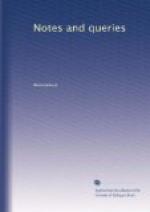Here is nothing said of this work being called [Old English: dom bec]: neither does Spelman, in his enumeration of the works of Alfred, give the least intimation that any one of his collections of laws was called [Old English: dom bec].
We know, indeed, that Alfred compiled a code of laws for his subjects; but whether any part of them has been preserved, or how much of them is embodied in subsequent codes, cannot now be determined. Asser mentions that he frequently reprimanded the judges for wrong judgments; and Spelman, that he wrote “a book against unjust magistrates,” but any complete body of laws, if such was ever framed by Alfred, is now lost; and that attributed to him in Wilkin’s Leges Anglo-Saxon, is held in suspicion by most writers.
For these reasons, and considering that Sir William Blackstone’s knowledge of English history was rather superficial, I incline to the belief, that the [Old English: dom bec] referred to in the laws of Edward the Elder, was some collection of laws made prior to the time of Alfred: this might clearly be the case, as Sharon Turner informs us that the Saxon laws were committed to writing as early as the commencement of the 7th century.
The opinions of your learned correspondents on this disputed point may be of much interest to many of your readers, and to none more than to
George Munford.
East Winch.
* * * * *{366}
MINOR QUERIES.
MSS. of the Wycliffite Translations of the Scriptures.—The Add. MS. 15,521., in the British Museum, contains a copy of Lewis’s edition of the Wycliffite New Testament, printed in 1731, with manuscript notes by Ames and Lewis, and the former has transcribed into it some additional prologues, prefixed to each book of the New Testament, which had not been printed by Lewis, and were taken by Ames from a MS. of the New Testament, written in 1424, and in 1731 in the possession of Thomas Granger. It would be very desirable to learn what became of this MS. subsequently. Granger died in the following year, but the MS. does not appear in the sale catalogue of his library, nor is it found in the catalogue of Ames’s own library, dispersed in 1760. Any information relative to this remarkable copy of the New Testament, would be very acceptable to the Editors of the Wycliffite Versions of the Scriptures, who are now, after a literary labour of more than twenty years, about to bring the work to a conclusion.




